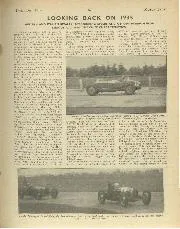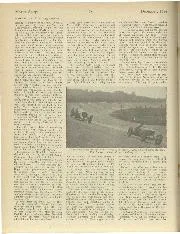

LOOKING BACK ON 1935
LOOKING BACK ON 1935 GERMAN AND ITALIAN RIVALRY, ASTONISHING SPEEDS AND A HAPPY FREEDOM FROM SERIOUS ACCIDENT THE CHIEF CHARACTERISTICS It is more probable that in years to come we…
Outboard Racing Problems
ALTHOUGH we would be the last to suggest that outboard motor boat racing has been a” flop ” in this country, it does seem that this year, interesting as it has so far been for the real enthusiast, has proved that the sport has not yet shown the wide appeal which was expected.
This state of affairs is certainly not due to the general nature of the sport which, as anyone who has tried it will agree, is full of thrill and interest.
The development of hulls too, is in the nature of research, and of great value. It is rather in matters of detail in the actual events, and the rules under which they are run, that the sport lacks some of the attractions which it .should possess. It must be remembered that one of the great values of this form of racing, is its propaganda effect on the spectators and general public.
The Would-be Competitor.
More, probably, than in *any other mechanical sport, the spectator is not only a possible user of an outboard motor, but also a potential competitor in these events. It is therefore of the utmost importance that it should appear attractive to him. At present, there is a sort of ” family party ” atmosphere about the game, which, though extremely pleasant for the happy band who at present constitute the chief exponents of the art, is, liable to exclude the man who would go in for it, but who is deterred from so doing by the points which •we are discussing.
There is no doubt that the actual racing lacks many features which should appeal to the interested spectator. By this is not meant the man who knows all the boats and pilots well, and is, therefore, always keen. Though some of the readers of MOTOR SPORT• who follow this branch may come in this category, the majority will rank merely as intelligent onlookers, who are always on the watch for any new form of competition in which they may indulge. There is no denying that outboard racing, as at present conducted, is liable to bore them, and give the impression that there is not much thrill to be got out of it. Also,
owing to the constant introduction of new models, it appears that to be successful will be expensive, and as the cheapness of this sport is one of its greatest points, anything which obscures this in the eyes of potential competitors, is something to be avoided.
• It is of course obvious that to criticise the efforts of others, who are working hard for the benefit of the sport, although easy, is quite useless unless some suggestions of a constructive nature are put forward. One of the most successful outboard events held this season, was the 100-miles race for utility craft at Poole, and there are many things to be learnt from this.
Starting Methods.
One of the weak points of most racing is the very uneven start, by the method developed simply from sailing. The method used at Poole, however, was a great improvement. Here all the boats were moored to a large hawser which acted as a starting line, and when the signal was given, engines had to be started up, and a very even start was the result.
This method has several advantages. It secures a start comparable with Brooklands ; it makes handicap starts simple, and this impediately gets over the trouble of competing against newer models.
It holds the spectators’ attention better than the present method ; and, above all, it encourages both manufacturers and tuners to develop easy starting.
The present day utility outboard motor, which is of course numerically by far the largest type, is a very easy starter. Some racing engines however, by the time some enthusiast has tried to get some more speed, and possibly upset the carburation a little, is often obstinate.
The sight of a hunched figure, sitting in the stern of what appears to be an overgrown shoe, playing feverishly with bits of string, what time he drifts helplessly about the water, is not an impressive sight. It is this sort of thing which discourages potential competitors, and which a revision of the starting rules on the lines suggested above would avoid.